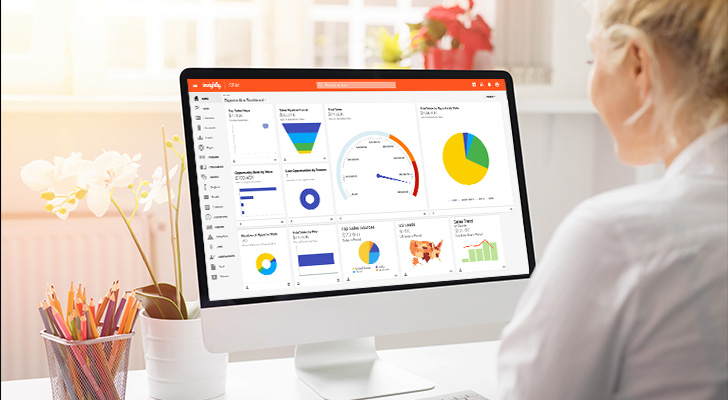Let’s talk about choosing a CRM for business development by starting with a definition. Organizations frequently use ‘business development’ (or ‘biz dev’) to describe the sales function—specifically the act of building pipeline. Some companies create business development teams with the expressed mission of increasing publicity and cultivating partnership opportunities. Still others consider it an operations team that supports ongoing product or service development and delivery.
While all of these definitions may be partially correct, business development, in its purest and simplest form, encompasses any activity or team that accelerates growth beyond its current pace. Highly effective business development teams align with senior management to identify, prioritize, and implement incremental growth opportunities. Business development CRM software can support this process.
In this post, we’ll explore how a CRM for business development can supplement biz dev efforts by streamlining sales development, relationship management, and capacity building. A business development CRM may be exactly what you need.

3 CRM use cases to support business development
For purposes of discussion, let’s assume that you’re the business development leader at a mid-market manufacturing company. Your leadership team has tasked you with the job of doubling revenue within eighteen months. What’s your first move?
Luckily for you, your organization uses a cloud-based CRM. Users are well-trained and actively use the system, which means you have a wealth of data and insights at your fingertips. After analyzing the data and considering all of your options, you sequence three cards on your kanban board.

1. Entry into an adjacent market
Although the vast majority of your existing revenue is from the automotive industry, you can’t help but notice the occasional outlier lead. In fact, your sales team has been tagging all non-automotive leads in your CRM in case someone ever decided to do something with them. (That’s you.) Further review uncovers a very interesting trend. That is, about half of your non-automotive inquiries originate from the boating and marine industry.
How business development CRM software helps: Tagged records accelerate your ability to identify data-driven, real world market opportunities without wasting time on gut feelings. Drag and drop reporting makes it easy for you to analyze audiences, understand each lead’s inquiry, and drill down for further insights. At-a-glance contact information within the lead record provides a convenient way to re-engage old leads when validating assumptions.
And, if the market is deemed viable, your CRM for business development enables a rapid ramp up of sales activity. For identical sales processes, an existing pipeline could be applied with a few clicks (instead of starting from scratch). Built-in outreach features, such as email inbox integrations, expedite your sales team’s ability to engage a large number of leads and convert them into paying customers.

2. Increasing production capacity to serve more customers
Not every business development opportunity requires expansion into a new market. Sometimes, there’s simply more demand than you can supply. When customer demand exceeds supply, it’s your job as the business development manager to step in and evaluate ways to increase capacity. After all, customers are willing and able to purchase—but only if your company can deliver.
Unfortunately, increasing supply is not as easy as flipping a switch. Doing so may require an upfront investment of additional tooling, equipment, labor, and production facilities.
How CRM business development software helps: Your CRM for business development should be an essential data source when building an expansion business case. Productivity metrics, such as project and milestone trends, offer a snapshot of existing workloads to inform complex staffing decisions. Transaction and invoice data stored in your CRM provides transparency for identifying large customers, who may be more likely to make advanced purchases. Intuitive business intelligence (BI) dashboards make it easy to visualize existing product sales trends and forecast the impact of additional capacity.

3. Leveraging existing relationships to evaluate product fit
Launching a new product is hard work and, in many cases, kind of a gamble. Will the downstream revenue more than offset the upfront cost and effort of commercialization? Pre-validating product fit with a critical mass of customers is an excellent way to reduce risk and improve your chances of success. If enough customers express a desire to purchase, non-customers will likely, too.
Existing customers also play a vital role in QA testing prior to full-scale launch. Beta testing with a group of loyal customers provides an unparalleled platform for collecting honest feedback and eliminating roadblocks to success.
How CRM business development software helps: Neatly organized customer records and data filtering in your CRM make it easier to identify and connect with customers who are willing to share feedback and participate in beta testing. Sorting records by creation date enables quick access to your longest-standing relationships, which could serve as a gold mine of support ticket data to substantiate product feasibility. Logging calls and notes directly in your CRM provides a convenient way to track customer conversations without relying on spreadsheets or other data silos.
Grow faster with a better CRM
Whether your goals involve expansion into new markets, maximizing output, or leveraging customer relationships to their fullest extent, a well-structured CRM is an essential part of any business development initiative, in any industry.
Is your CRM not up to the challenge? Check out Insightly’s switching CRMs eBook or continue reading about why companies switch CRMs.
Ready for a new CRM for business development? Request a free demo from Insightly. No commitment required.



